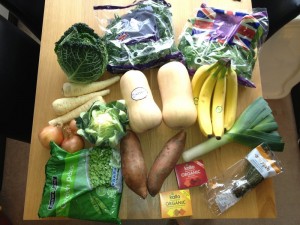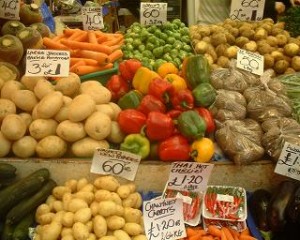How to Get the Most Benefit From Your Vegetables
We all know we should eat our vegetables, but you may have been making some simple mistakes with your cooking and preparing of them that has meant they haven’t been as good for you as they should be. This article will share 4 simple tips that will show you how to get the most benefit from your vegetables.
Eat your vegetables with a fat source.
Most people don’t realise that some vitamins are only absorbed when in the presence of fat, meaning you can be eating lots of vegetables but not getting all of the benefits from them. It’s like having a car but never getting out of second gear.
The vitamins A, D, E and K are known to be fat soluble and as a result will only be absorbed by the body in the presence of fat. In lots of cases, nature provides us with a natural fat source to allow the vegetables to be absorbed (such as in the case of vitamins found in meat, oily fish, dairy etc), but when this natural fat source doesn’t accompany the vitamins (as is the case with vitamins stored in vegetables), we need to add a fat source to them.
This doesn’t need to be a particular fat source by the way – you can drizzle your vegetables with a little olive oil or butter and that will be enough to aid the process.
If you are eating your vegetables with fat-containing foods such as meat or fish, you don’t need to add a fat source to them unless you want to for taste reasons.
Cook your vegetables as little as possible.
This one has been spread around a lot, but it still holds true. Keep an eye on your cooking time to help you get the most benefit from your vegetables.
When you cook your vegetables for a long time you damage the cell membranes, leading to vitamins and minerals being lost from the vegetables themselves. It appears to be a bit of a myth that high temperatures damage the vitamins themselves, but there is no doubt that over-cooking your vegetables damages the cell membranes which leads to a significant loss in nutritional benefit as the vitamins escape into the cooking water or air.
In some cases (such as tomatoes), cooking actually increases the nutrient density of the food, but as a general guide you should look to cook your vegetables as little as possible and even eat raw foods such as salads, fruit and some vegetables as and when you can.
Buy your vegetables locally and in season.
In order to get the most benefit from your vegetables, you need to buy them at their best.
Where possible, buy vegetables that have been grown locally to you. There is some evidence that the local soil profile contains the right kind of nutrients for the people living in the area. Whether this is true or not remains to be seen, but what is certainly true is the food miles will be almost non-existent, meaning it hasn’t been transported long distances, exposed to dramatic temperature change multiple times and wouldn’t have to be chemically-ripened or preserved.
If you buy from a farm shop, you are also forcing yourself to buy in season – you can only buy what the farmer can grown. It’s November now, so if I went to my local farm shop and tried to get strawberries, I’m out of luck – he can’t grow them here at this time of year. Buying vegetables in season means you’re buying them when their vitamin and mineral content is at its peak.
Don’t chop vegetables into tiny chunks.
I mentioned earlier that heat doesn’t destroy vitamins themselves, more the cell membranes that allows the vitamins to be lost to the air/water. Consider this when chopping vegetables – the smaller the chunks, the more surface area you have exposed which means there is more chance for vitamin and mineral escape.
There is also really credible research that shows exposure to air and light can damage certain vitamins, meaning you can lose the benefit from your vegetables even if you don’t cook them. You can avoid this by ensuring you store your vegetables in dark cupboards or the fridge and keep the chunks large when it comes to preparing them.
If you have only used part of a vegetable for a meal and want to store the other half, make sure it is kept in a cool, dark place and in an air-tight container, this will help maintain most of the benefits within your vegetables.
These four simple tips will help you get more benefit from your vegetables, which given we are heading into the winter will help you no end. For more help finding out the seasonality of various vegetables, try this fantastic guide from the BBC (northern hemisphere only really).
Many people wrongly assume that vegetables are boring and tasteless, but that doesn’t have to be the case. They are a great vehicle for flavours and sauces, not to mention varied in taste and texture. For more help concocting interesting vegetable dishes, try this book…



